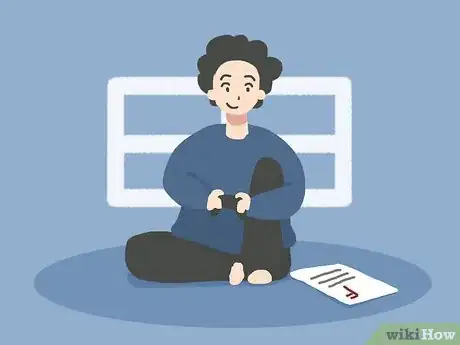This article was co-authored by Allen Wagner, MFT, MA. Allen Wagner is a licensed marriage and family therapist based in Los Angeles, California. He received his Master's in Psychology from Pepperdine University in 2004. He specializes in working with individuals and couples on ways they can improve their relationships. Along with his wife, Talia Wagner, he's the author of Married Roommates.
wikiHow marks an article as reader-approved once it receives enough positive feedback. In this case, 88% of readers who voted found the article helpful, earning it our reader-approved status.
This article has been viewed 22,940 times.
We’ve all been there: your parents are asking you (maybe even grilling you) about something and it seems like a simple lie could get you out of a big mess. The truth is it could actually end up getting you into more trouble. The good news is you’ve taken the first step by deciding that you want to stop lying to your parents. That’s great! Keep it up and you’ll be able to break the habit. To help you do it, we’ve put together a list of tips and strategies you can use to work on being more honest with them.
Steps
Pause to think before you speak.
-
It may help you resist the urge to lie whenever you start to feel it. It’s actually totally normal to feel tempted to tell a lie that could get you out of trouble or get you something that you want. The key is to not act on those urges. Consider the consequences of the lie you’re thinking of telling and think about how you would feel if your parents lied to you all of the time. No matter how tough it may be, tell your parents the truth. You may actually feel better afterward.[1] X Research source
- A lie can sometimes be the first thing that comes to mind when your parents confront you with something. Take a quick second to think about what you want to say when that happens.
- Fun fact: according to one study, telling the truth may actually make you a happier and healthier person! People who told fewer lies felt less moody and actually felt better physically. So lying may literally be bad for you.[2] X Trustworthy Source American Psychological Association Leading scientific and professional organization of licensed psychologists Go to source
Consider the potential consequences.
-
The consequences may be enough to deter you from lying. Chances are you’ve gotten busted for lying before, and you probably faced some sort of punishment for it. Whenever you find yourself in a situation where you think lying may help get you out of it, or help you get something you want, try to think back to a time where you regret lying. It may help you avoid choosing to do it again.[3] X Research source
- For instance, if you did poorly on a math test and your parents ask you how it went, remember a time where lying about your grades got you grounded.
- If you lie about going to a party, you could get grounded, right? It’s not worth it!
- Some lies may actually be counter-productive. For example, if you lie about being bullied or picked on, your parents won’t know that you’re struggling with something. They may be able to help you if you tell them the truth.
Identify what’s pressuring you to lie.
-
If you can figure out the reason, it can help you stop. Almost every lie has some sort of reason or motivation behind it. Think hard about the motivation for lying and use it to help you stop yourself from doing it.[4] X Research source
- If you wanted to go to a friend’s house, you might be tempted to lie and say their parents are home when they aren’t. But if you lie and get caught, you may not be able to go to your friend’s for a long time.
- You could also be tempted to lie and say you’re doing well in school even though you failed a math test so you can play your favorite video game. But it could end up getting you grounded for longer if you lie.
- You may also be tempted to lie about something more serious like someone hurting you at school. In that case, you may want to lie because you’re scared or embarrassed. But if you tell your parents what’s going on, they may be able to help you.
Talk to your parents about why you lie.
-
They may be able to find ways to help you stop. Find a good time to talk to one or both of your parents and explain your situation. Tell them that you’re struggling with telling them the truth and mention a few reasons you think are causing the problem. Be open and honest about your struggles and they may be willing to hear you out and come up with a game plan to make it easier for you to feel comfortable telling them the truth.[5] X Research source
- For instance, if you think your parents are too harsh on you about your grades, you could tell them that it makes you scared to tell them whenever you make a mistake at school or fail a test.
- You could also tell them that their punishments are too extreme and it makes you feel like it might be easier to just lie to them about where you are or what you’re doing.
- If you feel tempted to lie because you don’t think your parents will listen to your side of things, try telling them that. They may be more open to hearing you out if you’re more willing to tell them the truth.
- Your parents may ease up a bit and give you more freedom if you’re more honest with them.
Practice telling the truth with your friends.
-
Start small and tell them a few truthful things each day. Commit to making a stronger effort to not lie to your parents. Use your friends as practice! Force yourself to stop telling even harmless lies, a.k.a. white lies, and try to tell each of them a few honest things every day. In time, you can get better at telling the truth in general, which will make it easier for you to stop lying to your parents.[6] X Research source
- That doesn’t mean you need to be brutally honest or mean to your friends. Just don’t be dishonest with them.
- For instance, if your friend asks you if you saw the game last night, don’t tell that you did if you really didn’t. Sure, it may seem harmless, but lying can easily become a habit.
Fess up whenever you do lie.
-
Admit to it and ask your parents to forgive you. Even if it’s a small fib, just tell them exactly what happened and why you lied about it. They’ll appreciate your honesty and it can help motivate you to stop lying in the future.[7] X Expert Source

Marriage & Family Therapist Expert Interview. 6 March 2019. [8] X Research source- Try being direct and keeping it simple. You could say, “Mom, I’m sorry, I lied to you earlier” or “Dad, I lied to you and I feel terrible about it.”
- Once your parents realize that you're being honest with them and you're not hiding things, they'll probably start to relax and trust you more.[9]
X
Expert Source

Marriage & Family Therapist Expert Interview. 6 March 2019.
Find ways to reduce your stress levels.
-
Lying can sometimes be a reaction to feeling overwhelmed. If you’ve got a lot going on at school, work, with your friends, or with your boyfriend or girlfriend, it can pile up and stress you out. Lying can seem like an easy way to relieve pressure and avoid adding to your stress. But the truth is, it can actually make it worse. Find activities and exercises that work for you to relieve your stress a healthier way.[10] X Research source
- For instance, you could try yoga, meditation, or deep breathing exercises. You could also start hitting the gym or going on runs to get some healthy exercise that can lower your stress levels and make you feel better.
- If you feel overwhelmed with all of your responsibilities, try finding ways to better manage them (such as creating a schedule) or cutting out what you can. For instance, if your classes are tough, and you’re on both the basketball and the swim team, you may want to cut out basketball if you aren’t as passionate about it.
Try keeping a journal about your lies.
-
It can help you reflect and become more aware of your lying. If lying has become a serious problem for you, get yourself a journal or a notebook you can dedicate as a journal. Write down all of the lies you told during the day and think about each one while you do it. It can help you become aware of lies you intentionally told as well as lies you tell out of habit so you can be more self-aware, which may help you put an end to it.[11] X Trustworthy Source Recovery.org Resource run by the American Addiction Centers organization providing people with educational resources about substance abuse Go to source
- Try to come up with the reasons behind the lies. What was your motivation? How did a lie become a habit? Really explore what it is that makes you lie so you can better understand it and avoid doing it in the future.
Warnings
- If someone hurt you, tell your parents about it. Don’t lie to try to protect them or cover something up. Your parents love you and want to help you.⧼thumbs_response⧽
You Might Also Like












References
- ↑ https://www.thehopeline.com/how-to-stop-lying-part-1/
- ↑ https://www.apa.org/news/press/releases/2012/08/lying-less
- ↑ https://www.thehopeline.com/how-to-stop-lying-part-1/
- ↑ https://www.thehopeline.com/how-to-stop-lying-part-1/
- ↑ https://kidshealth.org/en/kids/talk-parents.html
- ↑ https://www.betterhelp.com/advice/how-to/overcoming-the-compulsion-how-to-stop-lying/
- ↑ Allen Wagner, MFT, MA. Marriage & Family Therapist. Expert Interview. 6 March 2019.
- ↑ https://www.thehopeline.com/how-to-stop-lying-part-1/
- ↑ Allen Wagner, MFT, MA. Marriage & Family Therapist. Expert Interview. 6 March 2019.
About This Article
























































